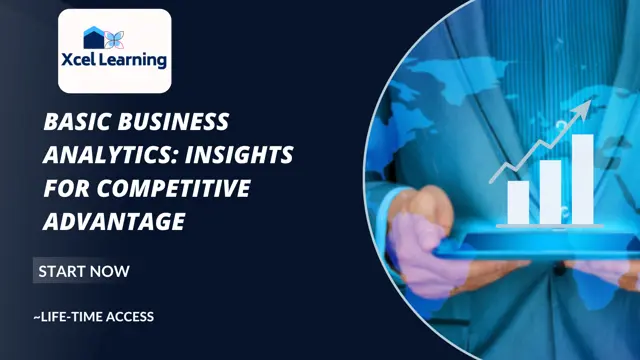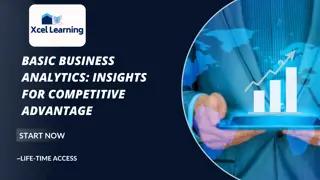
Basic Business Analytics: Insights for Competitive Advantage
Data-Driven Decision Making: Business Analytics Fundamentals
Xcel Learning
Summary
- Reed Courses Certificate of Completion - Free
Add to basket or enquire
Overview
"Business Analytics / Business Intelligence" is a course designed to provide students with an understanding of how organisations can use data and analytics to make informed decisions and drive business success. The course covers the basics of data collection and management, data visualisation, and statistical analysis. Topics such as predictive modelling, data mining, and machine learning are also covered to provide students with a comprehensive understanding of modern business analytics techniques. The course emphasises the use of practical tools and methods, including spreadsheets, statistical software, and dashboards, to analyse and interpret data. The goal of this course is to equip students with the skills and knowledge necessary to become proficient in business analytics and make data-driven decisions in a variety of business settings.
Curriculum
-
Introduction to Business Analytics 03:00
-
Data Collection and Preparation 06:00
-
Exploratory Data Analysis (EDA) 06:00
-
Introduction to Statistical Concepts 06:00
-
Data Visualization and Exploration 02:00
-
Regression Analysis 05:00
-
Predictive Modelling 03:00
-
Time Series Analysis 05:00
-
Clustering and Segmentation 05:00
-
A/B Testing and Experimental Design 06:00
-
Data Mining 04:00
-
Machine Learning 04:00
-
Business Intelligence and Dashboards 05:00
Course media
Description
Exciting Adventures Await: Discover the Fascinating Topics This Course Will Explore!
Subjects to be addressed within this course:
Chapter 1: Introduction to Business Analytics
- Definition and Purpose of Business Analytics
- Overview of Data-Driven Decision Making
- Importance of Data Management and Preparation
Chapter 2: Data Collection and Preparation
- Data sources and types (structured vs. unstructured data)
- Data collection methods and tools
- Data cleaning, preprocessing, and data quality assurance
Chapter 3: Exploratory Data Analysis (EDA)
- Descriptive statistics and data visualisation techniques
- Identifying patterns, outliers, and trends in data
- EDA best practices and common pitfalls
Chapter 4: Introduction to Statistical Concepts
- Probability and probability distributions
- Sampling and sampling distributions
- Hypothesis testing and confidence intervals
Chapter 5: Data Visualization and Exploration
- Introduction to Data Visualization Techniques
- Creating Effective Charts and Graphs
- Exploring Data Patterns and Trends
Chapter 6: Regression Analysis
- Simple linear regression
- Multiple linear regression
- Model evaluation and interpretation
Chapter 7: Predictive Modelling
- Overview of Predictive Modeling Techniques
- Simple Linear and Logistic Regression
- Model Selection and Evaluation
- Non-Linear Regression
Chapter 8: Time Series Analysis
- Understanding time series data
- Forecasting methods (e.g., moving averages, exponential smoothing)
- Seasonality and trend analysis
Chapter 9: Clustering and Segmentation
- K-means clustering
- Hierarchical clustering
- Applications in customer segmentation and market analysis
Chapter 10: A/B Testing and Experimental Design
- Designing experiments for business decisions
- Hypothesis testing in A/B testing
- Interpreting and acting on experimental results
Chapter 11: Data Mining
- Overview of Data Mining Techniques
- Clustering and Association Rules
- Decision Trees and Random Forests
- Text Mining and Sentiment Analysis
Chapter 12: Machine Learning
- Overview of Machine Learning Algorithms
- Supervised and Unsupervised Learning
- Neural Networks and Deep Learning
- Natural Language Processing
Chapter 13: Business Intelligence and Dashboards
- Overview of Business Intelligence Tools and Dashboards
- Designing Effective Dashboards
- Integrating Data from Multiple Sources
- Creating Interactive Reports and Visualisations
Unlock Your Potential: Enroll Today and Receive a Complimentary Digital Certificate Upon Course Completion!
Who is this course for?
The course "Basic Business Analytics: Insights for Competitive Advantage" is designed for individuals seeking to gain a fundamental understanding of data-driven decision-making in the business world. It is ideal for early-career professionals, recent graduates, entrepreneurs, and anyone interested in harnessing the power of data to drive strategic decisions and gain a competitive edge.
Questions and answers
Currently there are no Q&As for this course. Be the first to ask a question.
Certificates
Reed Courses Certificate of Completion
Digital certificate - Included
Will be downloadable when all lectures have been completed.
Reviews
Currently there are no reviews for this course. Be the first to leave a review.
Legal information
This course is advertised on reed.co.uk by the Course Provider, whose terms and conditions apply. Purchases are made directly from the Course Provider, and as such, content and materials are supplied by the Course Provider directly. Reed is acting as agent and not reseller in relation to this course. Reed's only responsibility is to facilitate your payment for the course. It is your responsibility to review and agree to the Course Provider's terms and conditions and satisfy yourself as to the suitability of the course you intend to purchase. Reed will not have any responsibility for the content of the course and/or associated materials.


